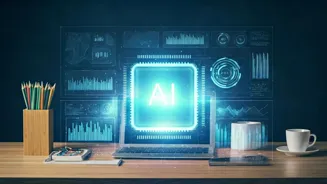AI's Job Impact
The CEO of Anthropic, Dario Amodei, has recently voiced concerns over the growing influence of AI, specifically its potential to alter the dynamics of the employment
landscape. He predicts that entry-level office positions could become obsolete within a span of one to five years. This forecast presents a critical juncture for both employers and employees, urging proactive consideration of how AI is poised to change the way work gets done. Amodei's warning is not just a casual remark but a serious indicator that the nature of these jobs, traditionally the starting point for many careers, may be irrevocably altered. This suggests that skills currently deemed essential might soon be less relevant as AI-driven systems take over routine tasks, leaving employees needing to adapt to new competencies or face job loss.
The Shifting Landscape
The integration of AI into various business operations is rapidly accelerating, which is what fuels Amodei's warning. AI is now being applied to automate numerous tasks that were once the exclusive domain of human employees. This ranges from data entry and basic customer service to report generation and administrative duties. As AI systems evolve, they become more efficient and accurate, often outperforming human workers in repetitive tasks. This trend has significant consequences for entry-level office roles. These positions often involve processes that can be readily automated, therefore making them particularly vulnerable to displacement. Companies, in their quest for increased efficiency and cost reduction, may opt to implement AI solutions. This strategic shift creates a wave of challenges, compelling workers to seek skills upgrades and adjust their career trajectories to remain relevant in the AI-driven workplace.
Preparing for Change
Amid these transformations, employees must prepare themselves for a new work environment. The first step is identifying what skills are valuable. Focusing on areas where AI's capabilities are limited can significantly increase employability. Skills like critical thinking, complex problem-solving, creativity, and emotional intelligence are becoming more important. Investing in training or education programs that build these competencies can be vital. Workers may also consider developing a niche skillset that combines human abilities with AI tools, therefore creating a hybrid model. For employers, this transformation demands proactive planning. Businesses must invest in retraining programs for employees to equip them with new skills, therefore ensuring a smooth transition and minimizing job losses. Implementing AI gradually and transparently can help build trust and acceptance among the workforce, improving overall productivity and morale.
Adaptation Strategies
The upcoming changes in the workplace demand adaptability and strategic planning by all stakeholders. Employees must actively seek educational opportunities to acquire new skills relevant to the evolving job market. Consider focusing on areas such as data analysis, AI application, and digital literacy, along with soft skills such as teamwork and communication. These skills are important because they enhance the ability to interact effectively with AI systems. Simultaneously, organizations must establish supportive environments that encourage innovation and ongoing learning. By embracing flexible work models and promoting continuous professional development, companies can empower their employees to thrive. Governments and educational institutions also need to play a role by revising curricula to emphasize skills for the future. Public-private partnerships can facilitate the development of workforce-ready skills, promoting inclusive economic growth. This collaborative approach will be vital to mitigating the negative impacts of AI and fostering a more resilient workforce in the long term.
















